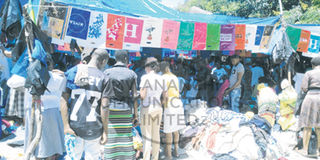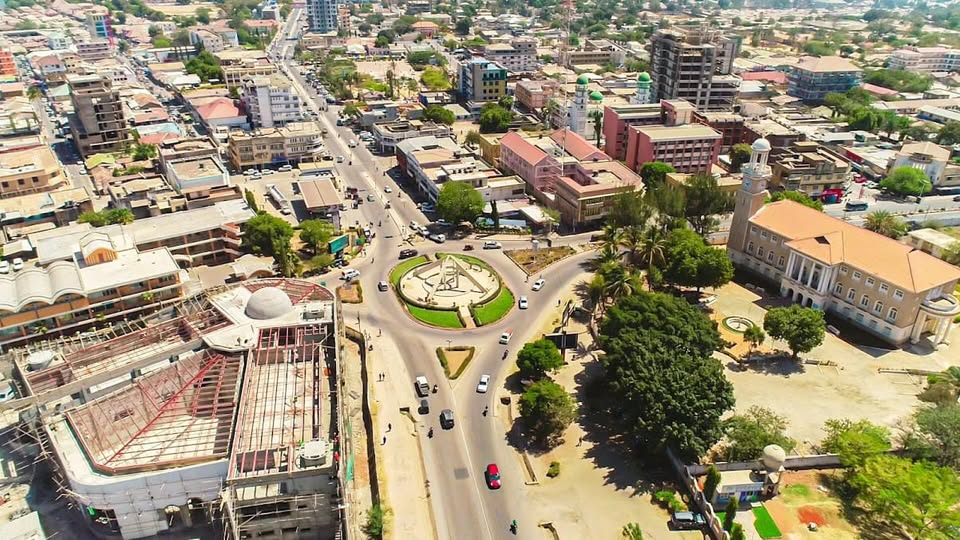Views on secondhand stuff ban sharply split

Potential customers assess goods at Makoroboi Market in Mwanza City. Photo / Jonathan Musa
What you need to know:
- Those involved joste for space in the various locations where the business is conducted.
- Pick pockets are also busy, taking advantage of big crowds to earn a living illegally.
Mwanza. Trading in secondhand goods is one of the most hectic in Mwanza, popularly known as rock city.
Those involved joste for space in the various locations where the business is conducted.
Pick pockets are also busy, taking advantage of big crowds to earn a living illegally.
Stroll into any secondhand commodity market in Mwanza and you will find yourself immersed in a miniature of life in the city, hectic but with organized and productive confusion.
These markets contain many communities and invite all classes of people who mingle and bargain for a common purpose, to sell and buy used clothes, shoes, school uniforms, radios, books, house appliances and all that are necessary.
Mwanza has many of these big markets, but you can find ‘mitumba’ virtually anywhere in the city. It is one of the biggest industries in the country and supports millions of people’s livelihoods, whether they are selling or buying.
People depend on the variety and affordability offered in secondhand items which generally arrive in bulk from upcountries especially western.
There is, however, a dark cloud looming over this multi-billion industry if a recent resolution by East African Heads of States is anything to go by.
Leaders of Kenya, Tanzania, Uganda and Rwanda met earlier this year in Arusha and made a determination to ban ‘mitumba’, especifically foreign-imported clothes and shoes, in favor of local goods.
These governments’ position is to revive the local textile and cotton industries that have been on the nosedive since the beginning of imported ‘mtumba’ in early 90’s.
Many people could thus be rendered jobless if the ban comes into effect.
According to government statistics, Makoroboi market alone, one of the biggest in Mwanza, hosts over 10, 000 traders.
Others include Buhongwa, Maduka Tisa, Nyegezi, Mkuyuni, Igoma, and Lango Moja.
Many people who were interviewed were surprised and worried about the ban and the effect it would have on both consumers and traders.
“Mitumbas are the backbone of society because they are cheaper compared to the stuff sold in boutiques.” said one consumer . Many others said that they believe the clothes or shoes from abroad are more durable. A buyer of shoes at Mwaloni market said: “Even if these are secondhand items, I know for sure that they are of high quality, especially some brands that last longer. That’s why they get here in very good condition, even after they have been used.”
In the early 70s and 80s, ‘mitumba’ were shipped from mainly western countries to help the needy. They were never meant for sale. Nevertheless, before long, entrepreneurs saw an opportunity and started importing and selling them.
Others love ‘mitumba’ because of the wide variety to choose from. People are spoilt for choice. Speaking at Mkuyuni market, which stretches from Butimba corner to Makarai, said, “I come here to shop for the goods I fancy and give me an air of high class. If I want a particular type and brand of jeans, I will find it here. The same applies to shoes, business wear, glasses, even caps.”
She worries that the ban will reduce her ability to find everything and anything under the sun without compromising her bank considerably.
“Politically, the traders will turn against their leaders for not championing their concerns and not supporting them in their hour of need. Economically, many will be rendered jobless,” she explained further. .
“The government will be denied revenue, socially, as result unemployment, many, especially young people, will turn to vices like drug abuse, crime, and violence.” said Alex Rweyemamu, a petty trader at Makoroboi market.
The circulation of secondhand commodities in Mwanza and surroundings regions is very high and this has increaded employment opportunities and reduced crime in the region, he added.
According to the Makoroboi petty traders association chairperson, Mr Alex Mandoto, he wonders if the government was serious in taking such a decision, because it will be tantamount to going backwards economically.
He pointed out, too, that, common wananchi would not afford imported stuff, and meeting the schooling expenses of their children will be near-impossible.
“We are sure that Tanzania has not yet attained the standard of making their own garments through internal industries, and to gove potential customers a wide variety of choices. As such, we will be purchasing goods from our neighbors like Kenya and Rwanda. We therefore urge the local organs to review the decisions for the good of the people and the national economy at large,” he said. .
Some people however hold a different view on the issue. They say a ban on secondhand goods will create room for local industries to prosper.
“I think it’s ok to ban the second hand commodities because they are being dumped ino Tanzania mainly from the West, as if we are incapable of producing such simple items as T-shirts,” remarked Mwajuma Pili, a resident of Igoma.
Hussein Abdi, an economist and a senior lecturer at St Augustine University, Mwanza, said that the idea of East African Community member states was essentially good, because it is anchored on the revival of local factories, but wondered whether our leaders had pondered on whether we can mobilise adequate capital to realise the ambitions.
Tanzania has even been hesitating to sign certain treaties related to the regional bloc. So, we have to be extra careful; else, we will end up wading in mud and suffer grave consequences,” he said.
Our five states which make up the East African Community differ from economical aspects to political platforms so let our leaders and the organs in charge to take a keen option that however will not irritate the poor Tanzanians who make a big percent of the total population,” Said Hussein.




